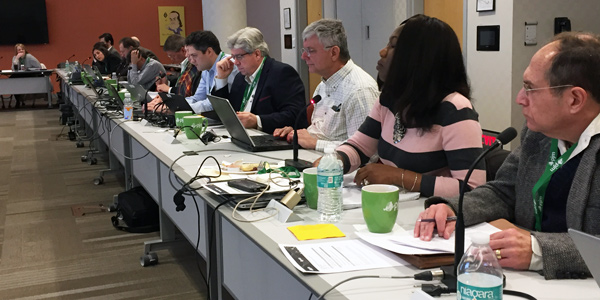By Rory D. Sweeney
VALLEY FORGE, Pa. — One thing is clear in the PJM turf war over control of the transmission replacement process: Neither side is conceding an inch until a FERC decision forces them to.
Representatives of transmission owners and their customers once again staked their claims at last week’s meeting of the Transmission Replacement Processes Senior Task Force (TRPSTF). TOs argued it’s their sole right and responsibility to manage their infrastructure, while transmission customers called for increased transparency of the processes TOs use to determine when towers and other equipment should be replaced. The projects are part of a class of transmission development that doesn’t require PJM approval, known as “supplementals.”
PJM staff stuck to a strict definition of the RTO’s role over such projects.
“We look at the reasonability of the information [TOs provide] and that they have followed the procedures that have been specified, but validation is a much stronger word,” Vice President of Planning Steve Herling said. “We validate that they follow their procedures. We cannot validate the individual elements of the actual material condition.”
The task force has made little progress since it was chartered in May 2016 to “develop alternatives for providing more transparency and consistency in the communication and review of end-of-life projects in the Regional Transmission Expansion Plan.” (See PJM Demands Agreement on Tx Replacement Definitions.)
FERC issued a show cause order in August 2016 questioning whether PJM TOs’ procedures for planning supplemental projects provided stakeholders opportunity for “early and meaningful input and participation,” as required by Order 890 (EL16-71). TOs included in their response a proposed addition to the Tariff known as Attachment M-3, which they argue would improve transparency.
The show cause order precipitated a 10-month hiatus of the task force, which ended in July. Since then, American Municipal Power and Old Dominion Electric Cooperative — who say they are advocating for their customers — have proposed an alternative to Attachment M-3 that would give PJM more say over when and how TOs can replace aging equipment. Currently, TOs fully control that process through Form 715.
The sides spent much of last week’s meeting walking through AMP and ODEC’s responses to questions TOs had posed about their proposal. The TOs argued that many of the AMP/ODEC provisions violate PJM’s governing documents and the organizational structure TOs agreed to when they joined the RTO. Exelon’s Gary Guy and Gloria Godson led much of the TO criticism.
“I cannot agree to” the AMP/ODEC proposal, Guy said. “We subjected ourselves to PJM, to their operational control … but not to any other third parties, and we’re not going to use the Tariff of PJM to write rules of compliance between us and third parties.”
PJM staff maintained their neutrality, saying that they expect TOs to provide explanations of their decisions but not information necessary to replicate their studies. Staff said the control they have over projects needed to address system reliability issues — known as “baseline” projects — doesn’t extend to supplementals.
“If it’s a baseline project, we get involved in that conversation [on sizing and specifications]. If it’s a supplemental … I don’t believe we have a role,” Herling said.
“I maintain my water heater … but after a while, when the bottom fell out of it, I went ahead and I had to get a new one. But I’m not characterizing my new water heater as maintenance,” AMP’s Ed Tatum said.
“You may choose to replace your water heater when the bottom falls out. Others may choose to replace it when it starts to get rusty on the top,” PJM’s Paul McGlynn responded.
PJM staff then walked through proposed solutions they developed internally. The proposals received substantial feedback from stakeholders, but TOs clarified at the end that their engagement didn’t represent approval.
“We’re not negotiating against our [M-3 proposal] in the FERC docket,” PPL’s Frank “Chip” Richardson said. “PJM’s proposal may go well beyond what transmission owners filed in that docket. We don’t know yet. We have to take it back and look at it.”





